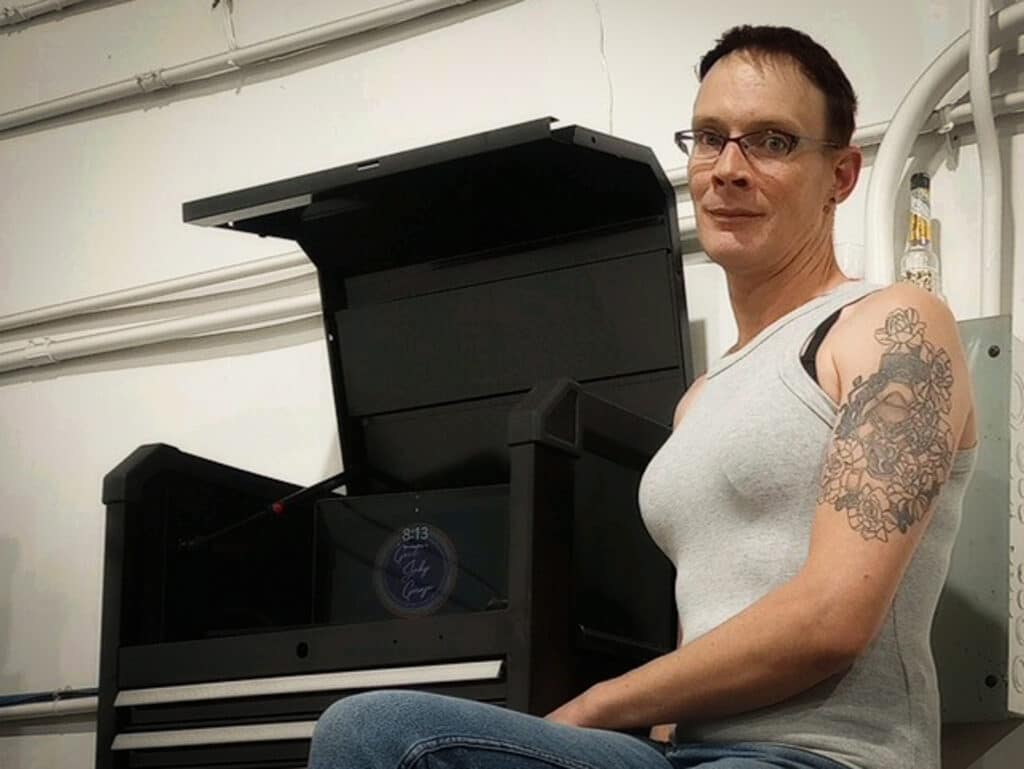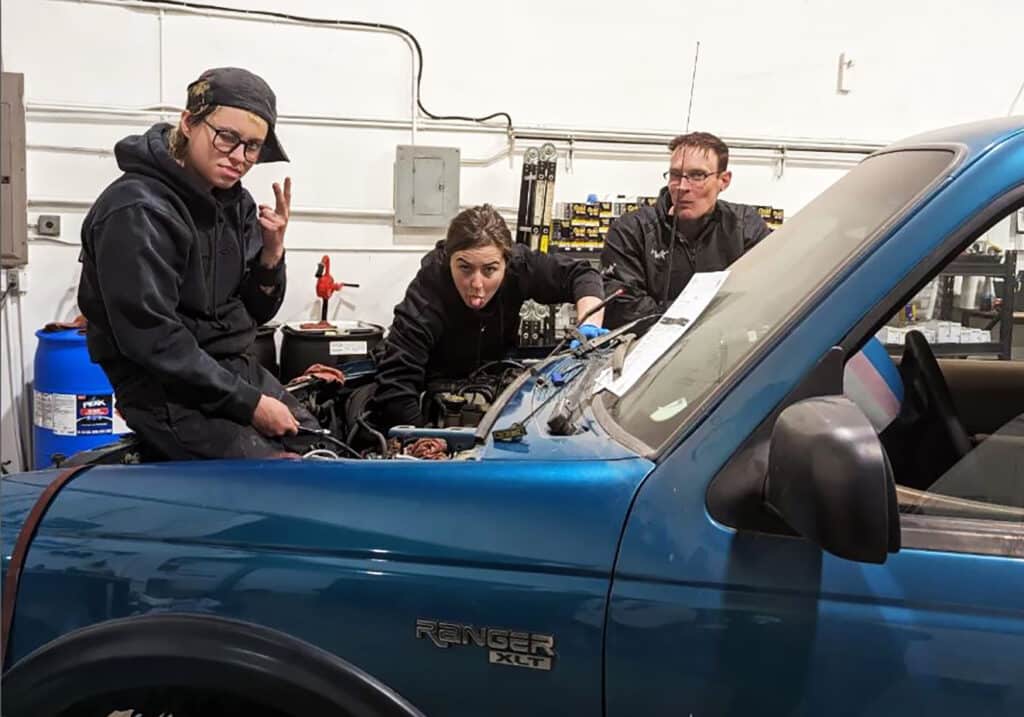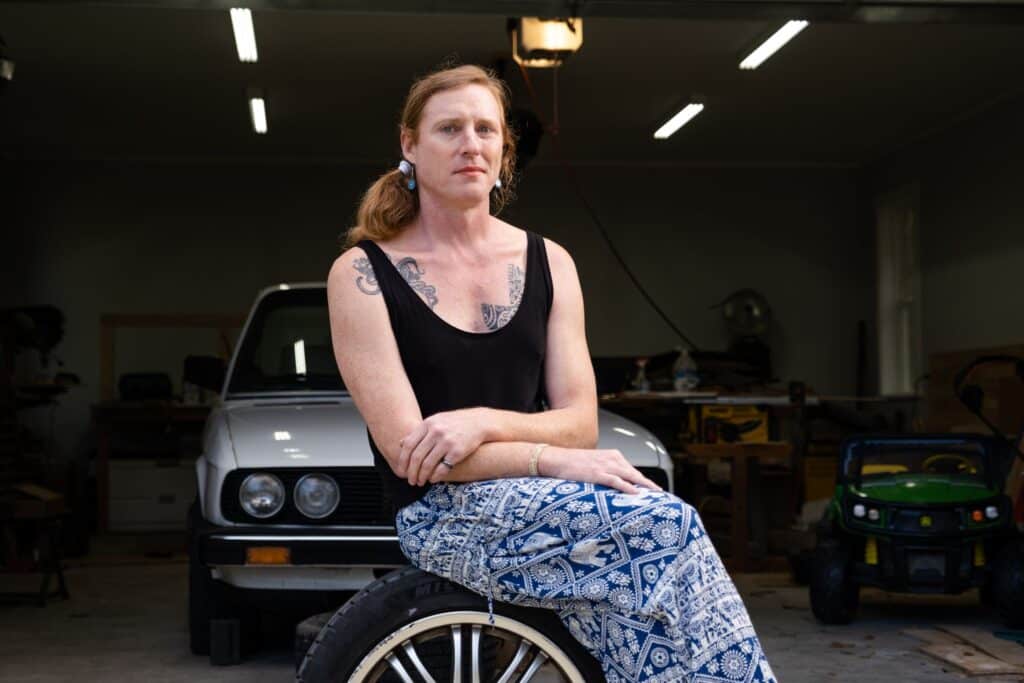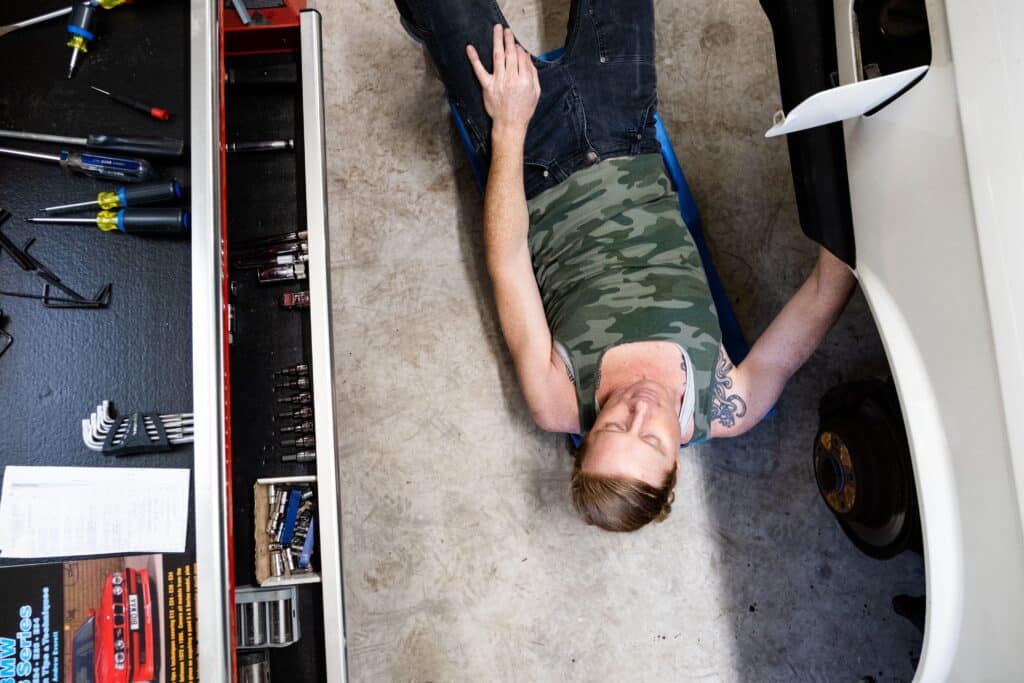Trans mechanics are here and contributing to gender diversity in the auto industry
Did you know that only 2.9% of all auto technicians are classified as female? But that doesn’t represent the full spectrum of gender diversity within the auto repair field. For Pride Month, Automoblog‘s David Straughan spotlighted two trans women mechanics, CC Haug, who owns and operates Good Judy Garage in Denver, Colorado, and Anna Ray, who works on her vintage BMW in Wilmington, North Carolina.
A 2018 survey by Deloitte and Automotive News asked women why they didn’t pursue a career in the automotive industry. The top answer to that survey, provided by 65% of respondents, was an “unappealing environment.” This suggests that a majority of women don’t find automotive industry jobs to be comfortable or welcoming opportunities – unsurprising, considering the lack of gender diversity.
While they account for slightly more than half of the workforce in total, people categorized as men comprise an overwhelming majority of auto mechanics. According to 2022 data from the U.S. Bureau of Labor Statistics (BLS), only 2.9% of the country’s 926,000 automotive repair technicians are categorized as “female.” While not all of the remaining 97.1% identify as men, it’s safe to say that the field is mostly represented by those who do.
Two people who don’t fit the traditional stereotype of an automotive technician are CC Haug and Anna Ray, transgender women who work on cars in different capacities. Automoblog spoke with Haug and Ray about their work inside the garage and lives outside of it to learn more about their experiences and perspectives.
The Auto Repair Industry Has a Gender Diversity Problem
This lack of diversity in the automotive repair industry is not for lack of exposure to or familiarity with cars among those representing other demographics. Fewer than half of licensed drivers in the U.S. in 2021 were categorized as male. Instead, at least one study suggests that a major reason for such overrepresentation is the dynamics of the industry itself.
In addition to the “unappealing environment” cited above, other reasons women gave in the survey were more structural in nature. A majority of respondents (59%) cited a “lack of work/life balance” as a reason for not pursuing an automotive career. Studies have shown that poor work/life balance may have a greater effect on women than on men, and have a more negative impact on their careers.
There also appear to be differences in how genders are treated as customers at auto shops. In their 2018 paper “Repairing The Damage: The Effect Of Price Expectations On Auto-Repair Price Quotes,” researchers at Northwestern University studied the prices people of different genders received when calling for repair quotes. It found that women received 6% higher quotes than men when not citing a price expectation.
The study did find, however, that this gender discrepancy was eliminated when customers conveyed that they knew the price to expect. Dr. Meghan Busse, one of the study’s authors, suggests that this reflects an inherent bias about gender as it relates to automotive knowledge.
“[T]he data are more consistent with statistical discrimination,” she says. “Shops believe, rightly or wrongly, that women know less about cars and car repair.”
“Enter: Good Judy Garage”
That gender inequity is part of what motivated CC Haug to open Good Judy Garage, a “queer owned and operated” auto repair facility in Denver, Colorado. Haug spent most of her life working with and around machines before publicly coming out and transitioning. She said that she began working on cars in her spare time while still in her career in the manufacturing industry.

“I was very closeted about my gender identity during that entire part of my life,” said Haug. “It was like, ‘Get up in the morning, put on the uniform, do what you’re supposed to do.’ I finally reached a point a few years ago where I decided I just couldn’t do it anymore. I needed to live life authentically and needed to move forward transitioning.”
Haug told Automoblog that she understood that her gender transition would also mean a career transition.
“I also knew that industry; automotive, manufacturing, and blue collar in general hasn’t had a history of being particularly welcoming to diversity,” she said. “That was certainly the culture in the manufacturing facility I was supervising.”
As she was searching for a new career direction, Haug said that she initially proposed the idea for Good Judy Garage to her partner in jest.
“One weekend I jokingly said to my partner – in life and business – Faith, ‘I wish I knew someone who had a nice shop where I could get back to working on cars and my gender identity wouldn’t be an issue.’ Her response was simply a pointed ‘why don’t we just open one?’
Enter: Good Judy Garage.”

Since opening in late 2021, Good Judy Garage has grown its team, received attention from media outlets such as The Denver Post, and gotten rave reviews from customers – currently owning a perfect 5.0-star rating on Google. Haug said that the attention Good Judy Garage received initially was more than she expected.
“From that initial inception, Good Judy Garage was intended to be a LGBTQ safe space for its employees and customers,” she said. “I was honestly surprised by the level of interest in what we were doing, and by how many people truly valued it.”
But while Good Judy Garage is intended as a safe space for members of the LGBTQ+ community to get auto repairs, it’s not limited to that community. Haug says that her shop is open to everyone and dedicated to treating people fairly, regardless of gender or other facets of their identity.
“The core value has always remained constant,” she said. “Every person – customers, employees, vendors, et cetera – that the shop interacts with needs to be treated with respect. As part of that, the quality of service we provide must be on par with or above industry standard for every single customer. We work to ensure that no customer feels talked down to or backed into a corner regarding services. We do not incentivize upselling in any way. We itemize quotes and invoices for transparency, and we strive to keep our prices competitive.”
“I’m a Driver. I Just Love It.”
Anna Ray is a combat veteran who served with the U.S. Army and began transitioning a little over two years ago. She is the owner of Built In Pride, a carpentry business. In her spare time, she works out of her Wilmington, North Carolina home garage tooling her own vehicles. While she said she doesn’t particularly enjoy working on cars, she said that doing so supports her true passion: driving them.

“I’m a driver,” she said. “I just love it, you know what I mean? The first thing I ever loved as a child was race cars. I went to my first dirt traffic race when I was, like, four. I just felt like, ‘Oh my God, I need to be a race car driver’ and I just never let that one go.”
Ray said she began doing automotive work at the age of 15 out of necessity. That early work eventually led her deeper down the auto repair rabbit hole.
“My parents never really bought me a car or any of that cool stuff,” she said. “I always had to buy them, so they were older and they had well over a hundred thousand miles. So, naturally they needed work. I just started fixing everything […] it kind of started with the basic stuff and […] all of a sudden I found myself doing like a whole cylinder head replacement on a Supra. I had my first car before I turned 16, as I had saved up like a couple thousand dollars and bought this old Dodge Ramcharger.
These days, Ray is working on a 1988 BMW E28 535i in her garage. She said that the car can be somewhat of a problem child, but one that’s worth the effort she puts into it — something fans of vintage BMWs can likely relate to.

“It looks cool, it’s really nice to drive, with that old mechanical feel,” said Ray. “But I’m tired of every other week, it’s like some new piece of rubber needs to be replaced. I had to replace some fuel lines because I was getting heavy gas smells. I’m in the middle of 18 other things too. But yeah, I love that car.”
“Attitudes Across the Industry Are Beginning To Shift”
Throughout the U.S., transgender people are facing a wave of anti-trans legislation and rhetoric.
At the time of publication, 19 states have passed laws that restrict or limit access to gender-affirming care for transgender people under the age of 18. Similar laws are being considered in eight states. This means that 44.1% of the roughly 300,000 high school-aged transgender youth in the country now live in states in which they have lost or risk losing access to gender-affirming care.
One of those states is North Carolina, where Ray lives. Lawmakers in the state have filed five separate anti-trans bills in 2023, ranging from bans on gender-affirming care to bans on trans girls competing in girls’ sports. Ray said that were it not for her wanting to stay close to her daughter, she would likely look to move somewhere else.
“Honestly, I am stuck here,” she said. “I have to live here pretty much because my ex-wife left me when I came out as transgender and we have a four year old daughter. If I had my way, I would either probably move to New England or Europe because some of these people are making it very hard for people like me to even go out in public.”
Ray and Haug were both adamant that such laws and cultural developments shouldn’t stop people from pursuing an automotive career.
“Attitudes across the industry are beginning to shift,” said Haug. “A lot of companies are beginning to understand that great employees don’t necessarily look a typical way, or fit a traditional stereotype.”
Ray said that finding one’s fit may be a challenge for people who don’t conform to that traditional stereotype. But she emphasized that technicians don’t have to stick it out in an environment that isn’t comfortable.
“If you walk into someplace and the vibes are off, then go down the street,” Ray said. “You’ll be surprised by how many different kinds of people you can find in the industry, even though it has that stigma of being nothing but cis men.”
Haug echoed those sentiments.
“There are lots of great shops out there,” she said. “Don’t ever convince yourself that you have to stay in a bad environment.”
Despite the current disturbing trends in government action and national discourse, both women offered encouragement for budding LGBTQ+ automotive workers. Ray said that increased visibility could lead to changes in attitudes and stereotypes.
“On the government level, it’s kind of bad, right?,” said Ray. “But most of the people you run into in your daily life are fine. They’re not there to judge you. They’re trying to live their life too. So it’s almost like you have to penetrate that barrier. And the more of us that do it, the more people will just be like, ‘Okay, I guess we have to be comfortable with this because they’re just coming anyway.’”
For Haug, there’s been no looking back since opening Good Judy Garage. The outpouring of support and messages of gratitude from customers has solidified her resolve that she made the right choice. During her interview with Automoblog, she expressed only one regret.
“I mostly wish I would have found the confidence to do it a lot sooner,” said Haug. “Someone once asked, ‘What’s to stop other shops from adopting these principles?’ My answer is simply that I hope they do.”
This article first appeared on Automoblog’s Pride Month feature about trans women mechanics.
*Editor’s note: This article cites statistics that use binary gender concepts in their data collection. We understand that this is a limited representation of gender diversity and does not take into account people who do not fit neatly into “male” or “female” statistical categories or people who do not identify as “men” or “women.” However, since we rely on government and academic data to inform our content, we are limited to how their data are collected, organized, and presented. In this article, we refer to the terms used in the studies and data we cite for clarity’s sake while asserting that future research can and should take the entire gender spectrum into account.






